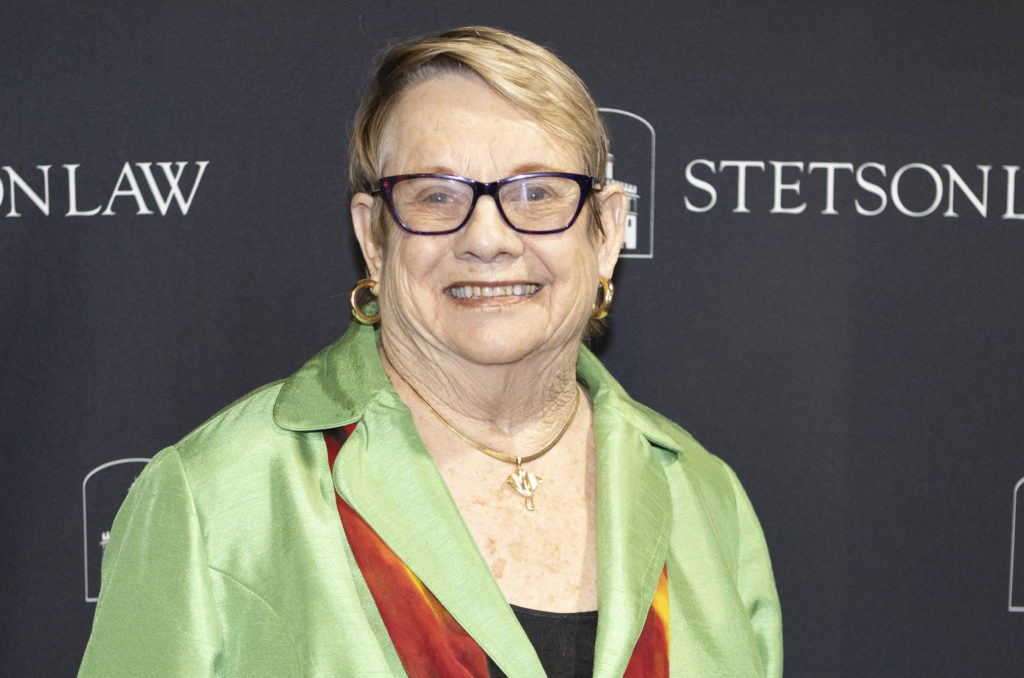Hon. Irene Sullivan Awarded for Decades of Work on Juvenile Justice

When she enrolled at Stetson Law, Irene Sullivan’s three children were 7, 6, and 2 years old.
At the time, she wasn’t planning on spending her career advocating for youth in the legal system – but given her own experience as a mother, cases involving minors always caught her eye.
Though she started out in private practice in corporate and family law, an opportunity to run for a judgeship led to years of passionate work in the area of juvenile justice.
“Kids deserve kind and nurturing treatment everywhere, even when committed, and that people will listen to make that happen,” she said in a 2012 interview.
On Sunday, April 21, Sullivan, who graduated from Stetson Law in 1977, was given the 2024 Wm. Reece Smith, Jr. Public Service Award during Stetson Law’s annual Inns of Court Banquet.
“Judge Sullivan is a champion for children and families and a true trailblazer,” said Law Professor Alicia Jackson, who specializes in juvenile and family law. “Through her work as a child advocate, judge, and author, she has made a meaningful difference in the lives of countless children. She has committed her career to being the voice for our nation’s children.”
The importance of asking why
Sullivan grew up in the Midwest and attended Northwestern University’s lauded Medill School of Journalism for her undergraduate years, and worked as a magazine writer and editor for a decade. When she moved to the Tampa Bay region with her family, including her small children, she decided to pursue a J.D. at Stetson Law.
After graduating, she spent years as a trial lawyer, including several years at a firm focusing on family law.
“I was just a general practice kind of attorney in St. Pete – I didn’t focus on juvenile law, but I was always more interested in cases that involved children,” she said.
She ran to be a circuit judge in 1998 and won a judgeship in the Unified Family Court of Florida’s Sixth Judicial Circuit.
Sullivan had a strong affinity for children whose circumstances, one way or another, led them to her courtroom. She handled cases involving kids in the dependents court, who were often abused, abandoned, and neglected as well as youth who were accused of committing crimes.
It didn’t take long for her to see the connection between the two groups.
“The same kids that were abused abandoned and neglected as toddlers, little kids, were out there committing crimes as teenagers,” she said.
Understanding the snowball effect the criminal justice system can have on a young person with a challenging background, Sullivan and her colleagues knew that, when it came to weighing potential outcomes involving minors who had committed crimes, they had to dig deeper.
“You have to focus on the kids and not so much what they did, which is horrible sometimes, but why they did it,” she said. “Juvenile judges all over the country that like being juvenile judges are always asking why.”
If abuse and neglect were the root causes, their approach to deterring a child from committing further offenses could focus on healing rather than locking them up. Sullivan and three other juvenile judges shared a floor with three child psychologists, which she said was incredibly helpful for the children who ended up at the courthouse.
“We could get help from those psychologists immediately, to do evaluations of kids and make recommendations for treatment, et cetera,” she said. “We were very, very fortunate and I think those child psychologists are wonderful people.”
She wrote an acclaimed book while on the bench, Raised by the Courts, about cases involving kids she had seen in court as a judge using pseudonyms to protect their identities.
Continued commitment to advocacy
Due to a state constitutional amendment requiring judges to retire at a certain age, Sullivan left the bench in 2010 – but she never stopped advocating for at-risk youth. She spent more than a decade working as a guardian ad litem acting on behalf of children.
She taught juvenile law as an adjunct professor at Stetson Law – a role she particularly enjoyed.
“Teaching about kids always connects with people because people always want to do good for kids,” Sullivan said. “My students felt the same way.”
Later this spring, she has a new book coming out called Born and Raised to Murder: a Failure of Foster Care, which tells the story of death row inmate Leo Boatman, whom she considers “the most abused and neglected foster kid in Florida.” Incarcerated from age 13 to 19, he killed two strangers upon his release. Sullivan took interest in the case and began writing Boatman to learn why his life took such a violent path. What she found was a horrific pattern of abuse, neglect, and systemic failure.
“I think what [the system] does to kids who start out smart and bright and normal, like every little kid, and then get neglected and abused in the system, and how they can turn out, is unfortunate for the people they kill and their families,” she said.
Most people working in the foster care system, she said, are caring.
“I’ve met excellent teachers and counselors,” she said. “I think most foster parents are very good. There are a few that aren’t, but overall, they take on a heavy load and they’re very good at what they do; very loving and kind to the children that they have in their homes.”
Sullivan joined the Stetson Law Hall of Fame in 2021, and her latest honor – named for William Reece Smith, Jr., a celebrated advocate for legal services who taught at Stetson Law – is yet another accolade recognizing her tireless advocacy for at-risk youth.
“There are lots of people out there doing good things for kids, so I’m honored that they chose me,” Sullivan said.
Post date: April 23, 2024
Media contact: Kate Bradshaw
[email protected] | 727-430-1580